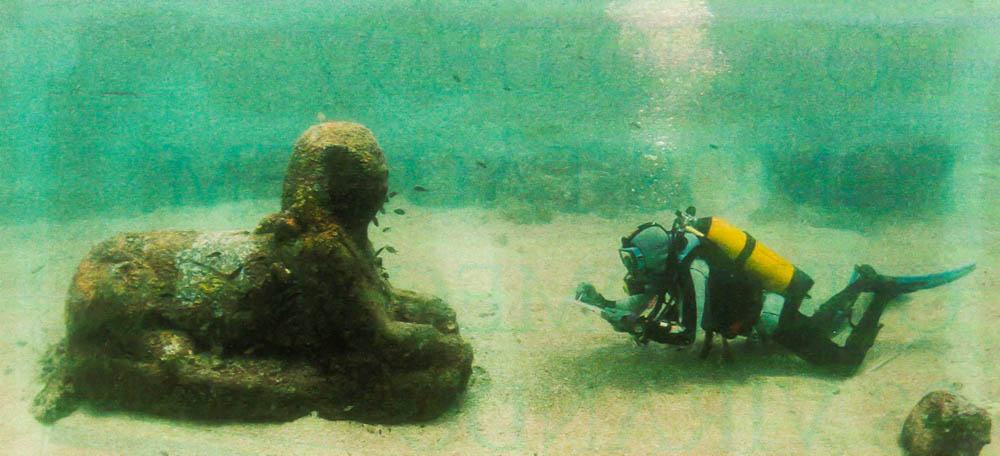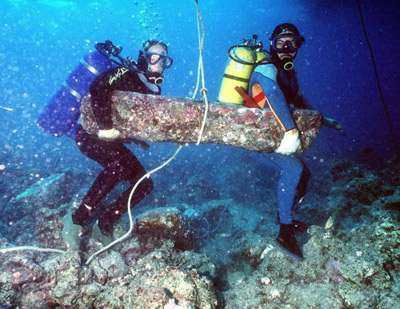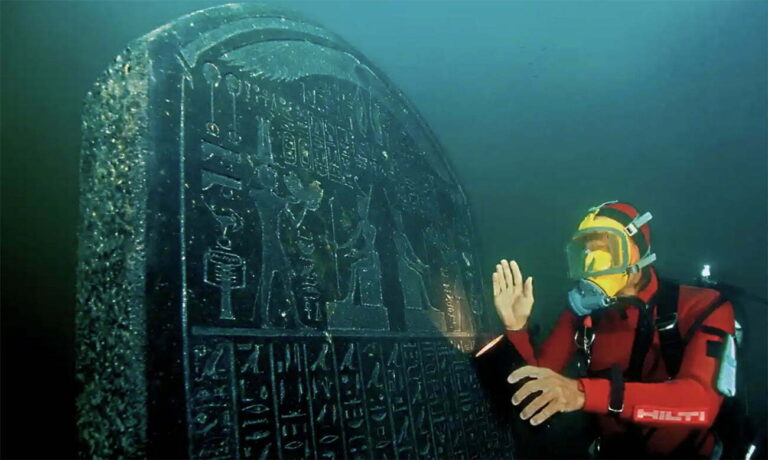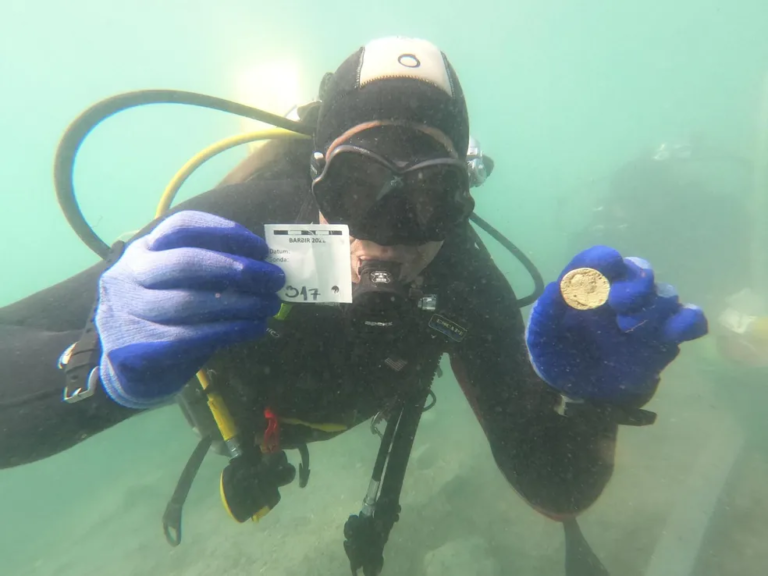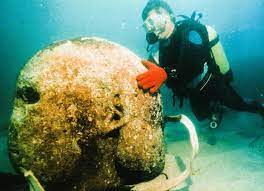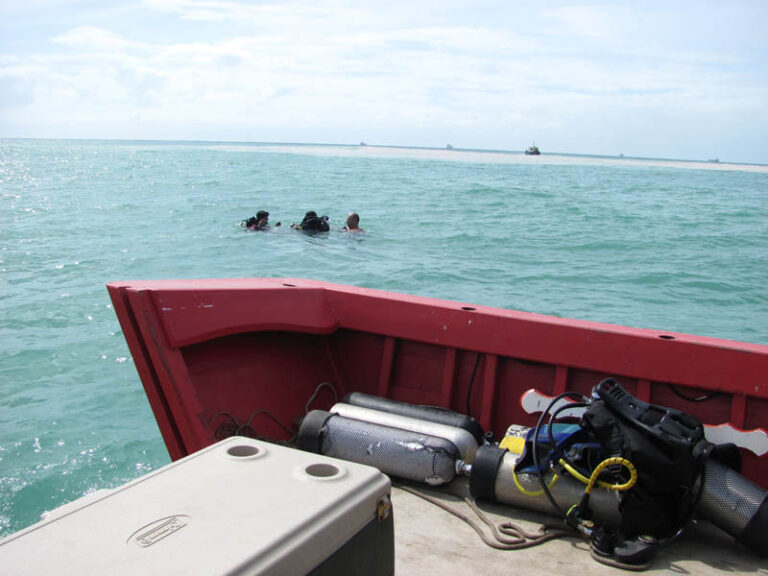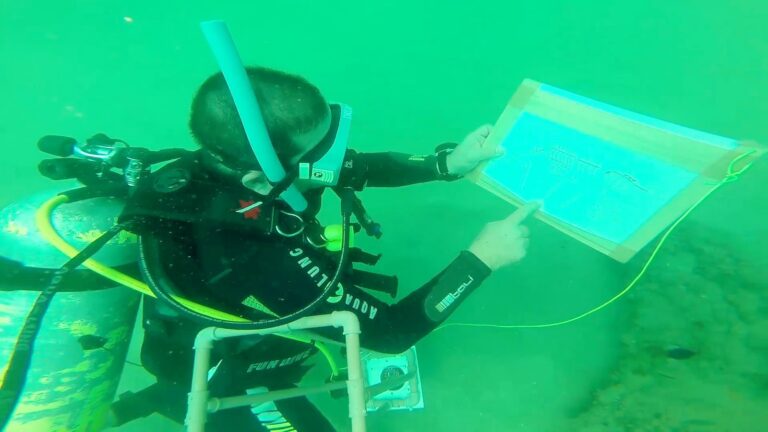Recreational Diving and Archaeology: Discover Ocean Treasures
Recreational diving has become increasingly popular in recent years, as more and more people seek adventure and exploration in the underwater world. This exciting activity allows individuals to immerse themselves in a different realm, discovering the wonders that lie beneath the ocean’s surface. But recreational diving is not just about the thrill; it also holds a significant connection to archaeology. Through diving, individuals have the unique opportunity to uncover ocean treasures that hold historical and cultural significance.
The connection between recreational diving and archaeology is a fascinating one. As divers explore the depths of the ocean, they often stumble across hidden artifacts and ancient remains. These discoveries provide valuable insights into our past and contribute to ongoing research in the field of archaeology. The combination of adventure and the thrill of uncovering these ocean treasures is what makes recreational diving truly captivating.
Diving has proven to be an active and essential part of archaeological discovery. Recreational divers play a crucial role in contributing to the research and understanding of underwater sites. They observe and document their findings, providing valuable information that assists archaeologists in their work. Their observations during dives can uncover new historical shipwrecks, ancient artifacts, and other significant discoveries that were previously unknown to the scientific community.
One of the most alluring aspects of recreational diving is the exploration of historical shipwrecks. These underwater time capsules not only hold historical value but also provide divers with a sense of adventure. Famous shipwrecks around the world, such as the Titanic or the USS Arizona, attract divers from all over. The process of exploring and documenting these shipwrecks allows divers to delve into history and witness firsthand the remains of these once majestic vessels.
In addition to shipwrecks, recreational divers can stumble upon ancient artifacts during their dives. These artifacts have the potential to provide invaluable historical and cultural insights. From ancient pottery to tools and ornaments, these discoveries offer a glimpse into past civilizations. It is imperative for divers to approach these artifacts responsibly, handling them with care and reporting their findings to proper authorities.
Recreational divers also play a vital role in preserving underwater cultural heritage. Historical sites and artifacts underwater face numerous threats, including looting, degradation, and environmental factors. By respecting these treasures and following ethical diving practices, recreational divers can actively contribute to their protection and conservation. Their involvement ensures that these ocean treasures remain intact for future generations, allowing everyone to continue to learn from and appreciate our rich maritime history.
Table of Contents
The Role of Recreational Divers in Archaeological Discoveries
Recreational diving has become an incredibly popular activity, allowing enthusiasts to delve into the wonders of the underwater world. But did you know that recreational divers also play a significant role in archaeological discoveries? These adventurous individuals actively contribute to archaeological research, bringing a fresh perspective and valuable insights to the field.
During their dives, recreational divers have the unique opportunity to observe and explore underwater sites that have historical and cultural significance. Their observations and findings provide crucial data for archaeologists, helping them piece together the puzzle of our past. The diver’s ability to navigate through underwater environments allows them to access areas that may otherwise be difficult to reach, uncovering hidden artifacts and structures.
One of the key contributions made by recreational divers is their ability to spot and document important discoveries. Their keen eyes and knowledge of archaeological methods enable them to identify artifacts and structures that may have been overlooked or unrecognized. This attention to detail has led to significant finds in the past, including ancient pottery, shipwrecks, and even lost cities.
In addition to their observational skills, recreational divers also contribute through their documentation of underwater discoveries. With advancements in underwater photography and videography, these adventurers can capture images and footage of historical sites and artifacts. This visual documentation provides an invaluable resource for researchers, allowing for further analysis and study.
Recreational divers have made noteworthy contributions to archaeological discoveries worldwide. For example, in the Mediterranean Sea, divers have helped uncover well-preserved ancient shipwrecks from various time periods. These findings have shed light on ancient trade routes, maritime history, and even ancient seafaring techniques. Similarly, divers exploring the Great Barrier Reef in Australia have stumbled upon Aboriginal shell middens, providing insights into the long history of indigenous habitation in the area.
In conclusion, recreational divers are not just passionate adventurers but also important contributors to archaeological research. Through their observations, findings, and documentation, they provide valuable insights into our underwater heritage. Their active involvement in the preservation and study of underwater cultural sites and artifacts helps us better understand our past. So, if you are an adventurous soul seeking to explore the depths of the ocean, remember that your passion for recreational diving can also contribute to the exciting world of archaeology and the discovery of ocean treasures.
Exploring Historical Shipwrecks
Diving to explore historical shipwrecks is truly a captivating experience, filled with allure and excitement. The deep-sea mysteries and the stories hidden beneath the waves have always fascinated adventurers and history enthusiasts alike. Recreational diving allows individuals to embark on these thrilling expeditions, connecting them with the past and uncovering ocean treasures.
There are numerous famous shipwrecks around the world that attract recreational divers from all corners of the globe. One such example is the RMS Titanic, which sank in 1912 and was rediscovered in 1985. This colossal shipwreck continues to captivate divers with its historical significance and the tragic tales it represents. Other notable shipwrecks include the SS Thistlegorm in the Red Sea and the Great Barrier Reef’s SS Yongala, both offering a glimpse into the past and an opportunity for exploration.
When it comes to exploring and documenting shipwrecks, meticulous planning and preparation are essential. Divers must possess the necessary skills and knowledge, as well as advanced diving equipment, to ensure their safety and effectively navigate the underwater terrain. The process involves conducting research to locate potential dive sites and then meticulously documenting the findings through photography, videography, and sketching. These records serve as valuable resources for archaeologists and historians in piecing together the history and significance of these wrecks.
As recreational divers delve into the depths to explore shipwrecks, they uncover a world of historical artifacts. These artifacts not only provide insights into the past but also hold immense cultural and historical significance. From ancient pottery and cannons to personal belongings and cargo, each discovery adds a piece to the larger puzzle of maritime history. It is crucial for divers to handle these artifacts responsibly and report their findings to archaeological authorities, ensuring the preservation of these priceless treasures.
In conclusion, recreational diving offers individuals a unique opportunity to explore the historical wonders of shipwrecks and discover ocean treasures. Through careful planning and responsible diving practices, divers can actively contribute to the preservation and understanding of our underwater heritage. The allure and excitement of diving to explore shipwrecks go hand in hand with the responsibility to respect and protect these historical sites. Embarking on such underwater adventures not only satisfies our sense of exploration but also allows us to contribute to the conservation of our past for future generations.
Discovering Ancient Artifacts
Recreational divers have the incredible opportunity to stumble upon priceless ancient artifacts during their dives. As they explore the depths of the ocean, they may come across remnants of bygone civilizations that have been preserved underwater for centuries. These discoveries hold tremendous historical and cultural significance, providing valuable insights into the past.
When recreational divers come across ancient artifacts, it is important to recognize the potential significance of these findings. These artifacts can shed light on the lifestyles, traditions, and technologies of past civilizations, offering a glimpse into the rich tapestry of human history. From ancient pottery and tools to intricate jewelry and sculptures, these artifacts are like time capsules that bridge the gap between the past and the present.
As responsible divers, it is crucial to approach these discoveries with care and respect. Handling artifacts should be done cautiously, ensuring that they are not damaged or disturbed. Additionally, it is important to report any significant findings to the appropriate authorities or archaeologists. This responsible approach ensures that these priceless artifacts can be properly studied, preserved, and shared with the world.
Recreational divers who stumble upon ancient artifacts have the opportunity to contribute to the collective understanding of human history. By reporting their findings, they can assist archaeologists in piecing together the puzzle of the past. Through their efforts, these divers become an integral part of the exploration and preservation of our underwater cultural heritage.
In conclusion, recreational diving not only offers the thrill of exploration but also the chance to encounter ancient artifacts that hold historical and cultural significance. By responsibly handling and reporting these discoveries, divers can make valuable contributions to the understanding and preservation of our shared heritage. So, strap on your diving gear and embark on an adventure to uncover the secrets hidden beneath the ocean’s surface. Let us dive into the depths and uncover the treasures that await us.
Protecting Underwater Heritage
Preserving underwater cultural heritage is of paramount importance as it allows us to safeguard invaluable remnants of our history and culture. Historical sites and artifacts that lie beneath the ocean’s surface are not immune to the threats posed by time and human activities. It is crucial to recognize the significance of these treasures and take necessary actions to protect them.
Underwater historical sites and artifacts face various threats, including natural degradation, looting, and damage from human activities. The passage of time, combined with saltwater corrosion and currents, can result in the deterioration of these precious remnants. Furthermore, looting and illegal treasure hunting pose a significant threat, as unscrupulous individuals may exploit and profit from these valuable artifacts. Additionally, irresponsible diving practices and accidental damage caused by recreational divers can also jeopardize the preservation of these treasures.
Recreational divers play a vital role in protecting and conserving underwater heritage. Through their passion for exploring the underwater world, recreational divers have a unique opportunity to be the guardians of history. By being aware of the historical importance of these underwater sites, they can actively contribute to their preservation. Recreational divers can act as vigilant observers, reporting any signs of damage or potential looting they come across during their underwater explorations.
Furthermore, raising awareness among the diving community about the importance of responsible diving practices is crucial. By emphasizing the need to respect underwater archaeological sites and artifacts, recreational divers can help prevent inadvertent damage caused by their activities. It is essential to educate divers on the potential consequences of their actions and encourage them to adopt ethical and responsible approaches while diving. By following guidelines and best practices, recreational divers can contribute significantly to the protection of underwater cultural heritage.
In conclusion, preserving underwater heritage is a collective responsibility that requires the active participation of recreational divers and the broader diving community. **By recognizing the importance of underwater cultural heritage, understanding the threats faced by historical sites and artifacts, and actively engaging in the protection and conservation efforts, recreational divers can make a significant impact in safeguarding these treasures for future generations to explore and appreciate.
Responsible Diving Practices
Recreational diving is an exhilarating activity that allows individuals to explore the depths of the ocean and uncover hidden treasures. However, it is crucial to approach this pursuit with a sense of responsibility and respect for the underwater archaeological sites and artifacts that lie beneath. Following ethical diving practices is not only essential for the preservation of these historical sites, but also for the safety of divers themselves.
Emphasizing the significance of following ethical and responsible diving practices is paramount in protecting underwater cultural heritage. It is vital for divers to be aware of the potential impact their actions can have on these fragile ecosystems. By adhering to guidelines set forth by diving organizations and professionals, recreational divers can ensure their actions have a minimal negative impact on the underwater environment.
Respecting underwater archaeological sites and artifacts is of utmost importance. These sites are not just fascinating remnants of the past, but also valuable pieces of history. Touching, removing, or disturbing these artifacts not only jeopardizes their preservation but may also be illegal in some instances. By refraining from touching or taking anything from these sites, divers are actively contributing to their protection and conservation.
To engage in responsible diving, here are a few tips and guidelines for recreational divers to follow. First and foremost, it is essential to receive proper training and certification before embarking on any diving expedition. This ensures that divers are equipped with the knowledge and skills to navigate underwater safely and responsibly.
Secondly, divers should always plan and organize their dives in advance, paying close attention to any restrictions or guidelines set by local authorities or dive operators. This includes staying within designated dive areas and not venturing into protected or off-limits areas.
Additionally, it is important for divers to refrain from disturbing marine life or damaging corals and other underwater habitats. This can be achieved by maintaining neutral buoyancy, practicing good underwater navigation skills, and avoiding physical contact with the environment.
Lastly, divers should make a conscious effort to clean up any waste they encounter during their dives. This includes picking up any litter or debris they come across, as well as avoiding the use of products that can harm the environment, such as sunscreen containing oxybenzone.
In conclusion, responsible diving practices are crucial for the preservation of underwater archaeological sites and artifacts. By following ethical guidelines, respecting these historical treasures, and adhering to responsible diving practices, recreational divers can contribute to the protection and conservation of underwater heritage. Let us all strive to seek adventure while preserving the environment for generations to come.
Conclusion
In conclusion, the connection between recreational diving and archaeology is a fascinating one. Recreational divers play a crucial role in archaeological discoveries, contributing actively to research and making important observations and findings during their dives. The allure and excitement of exploring historical shipwrecks attract divers from all over the world, as they dive into the depths of the ocean to uncover hidden treasures of the past. Discovering ancient artifacts during dives is not uncommon, and these findings hold immense historical and cultural significance. However, it is essential for recreational divers to approach such discoveries responsibly, handling and reporting priceless artifacts with care.
Preserving underwater cultural heritage is of utmost importance, as historical sites and artifacts face various threats underwater. Recreational divers have a significant role to play in protecting and conserving these treasures. Following ethical and responsible diving practices is crucial to ensure the preservation of underwater archaeological sites and artifacts. Respecting these sites and artifacts is vital, as they are not only historical and cultural gems but also fragile and delicate. By engaging in responsible diving and adhering to guidelines, recreational divers can contribute to the preservation of underwater heritage.
In conclusion, recreational diving offers the opportunity to discover ocean treasures and delve into the rich history that lies beneath the surface. The thrill of exploring shipwrecks, stumbling upon ancient artifacts, and diving into the unknown is unparalleled. I encourage readers to seek out adventure and delve into recreational diving, not only for their own enjoyment but also to contribute to the preservation of underwater heritage. By doing so, we can ensure that future generations can continue to appreciate and learn from the wonders that lie beneath the waves.

